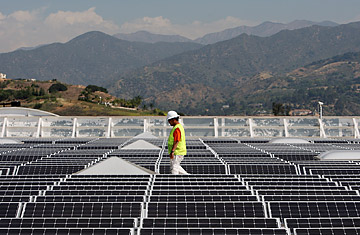
Solar panels cover the roof of a store in Glendora, Calif.
Environmentalists are great at visualizing catastrophe — just see An Inconvenient Truth — but even the most doom-filled green would have had a difficult time imagining the past 12 months. From the debacle of the hacked Climategate e-mails to the bitter disappointment of Copenhagen to the slow death of carbon cap and trade in the Senate, the past year has mostly been one of reversals for the U.S. environmental movement.
The midterm elections aren't looking any better. Tea Party-backed candidates not only oppose cap and trade, they question the reality of climate change. (Ron Johnson, the Republican candidate who may unseat Senator Russ Feingold in Wisconsin, chalks up any climate change to "sunspots.") Even many Democrats are running away from climate and energy legislation — Joe Manchin, the Democratic candidate for Senate in West Virginia, filmed an ad that shows him actually shooting a bullet into a cap-and-trade bill. (That's pandering to two constituencies with one bullet!) And fossil-fuel companies are flexing their political muscle, flooding conservative candidates with quantities of cash that environmental groups can't possibly match.
But it's a different story in California, where a coalition of Hollywood celebrities, philanthropists and tech billionaires is fighting to save a favorite piece of climate policy and backing its efforts with millions of dollars in campaign donations. The battle is over Proposition 23, a ballot initiative that would all but repeal California's landmark climate-change law. And unlike in much of the rest of the country, in the Golden State, the greens look to be winning — in campaign cash and at the polls. "The coalition we've put together to fight Prop 23 is the new face of the environmental movement," says Annie Notthoff, California advocacy director for the Natural Resources Defense Council (NRDC). "This is enough to actually make a difference in the political process."
Here's what Proposition 23 would do. In 2006 — with the support of Governor Arnold Schwarzenegger, perhaps the last green Republican left — California passed the Global Warming Solutions Act, also known as AB 32. The law requires the state to reduce its greenhouse-gas emissions to 1990 levels by 2020 — roughly a 25% cut off business-as-usual numbers — and empowers the California Air Resources Board to create the policies to reach that goal. Essentially, AB 32 did for California what the cap-and-trade bills rejected by the U.S. Senate would have done for the nation as a whole: chart a path to a low-carbon economy.
AB 32 was always controversial, with opponents claiming that the bill would raise energy costs and drive businesses out of California, and supporters arguing that it would kick-start the state's nascent clean-tech industry. So it's not surprising that in California — with its grand, if dysfunctional tradition of direct democracy — a pair of conservative state assemblymen would eventually produce a ballot initiative like Proposition 23. The initiative wouldn't repeal AB 32 — rather, it would suspend it until California's unemployment level had fallen to 5.5% or lower for four consecutive quarters, on the grounds that the state wouldn't be able to afford action on climate change until the economy improved.
Sounds somewhat reasonable. Except that as Schwarzenegger and other opponents of the initiative point out, California's unemployment is currently at 12.4%, and it hasn't been at 5.5% or below for an entire year since 1980. That means that if Prop 23 passes, it would essentially end AB 32. "It's an attempt to kill an energy revolution under way in California," says Tom Steyer, a financier and the co-chair of the No on Prop 23 campaign.
